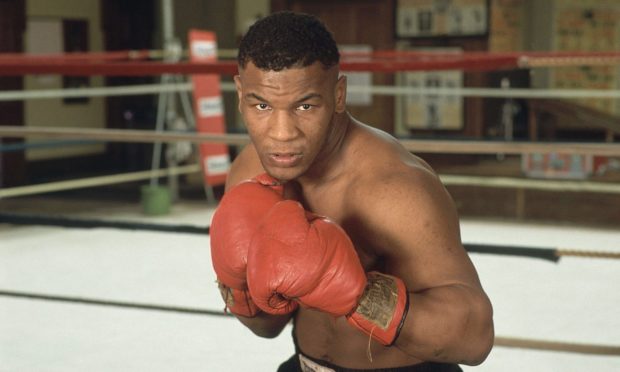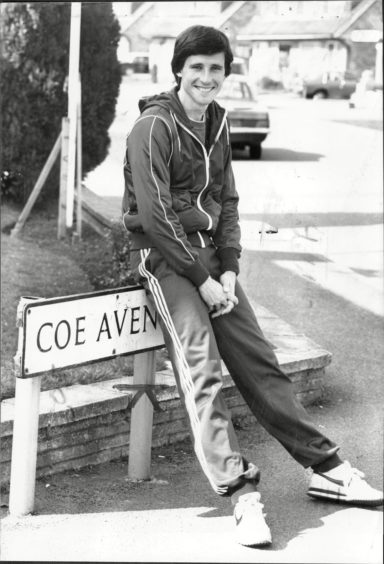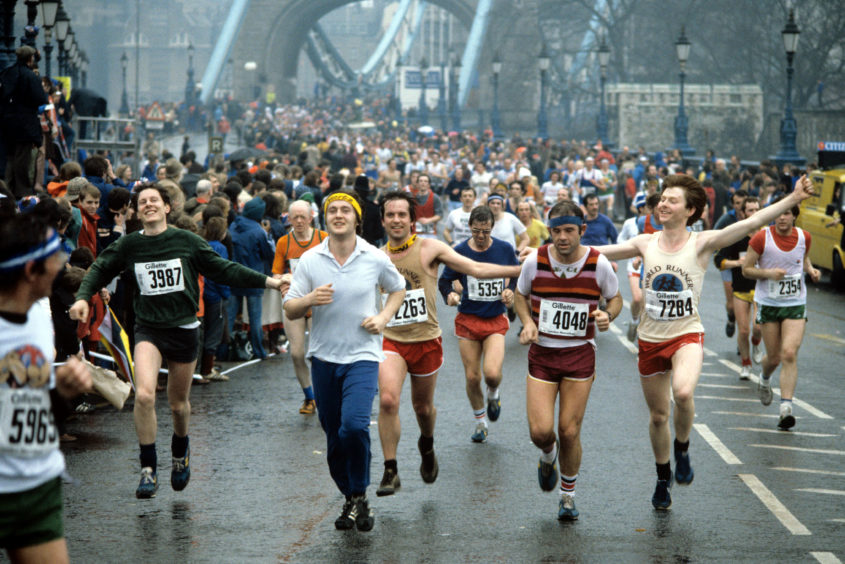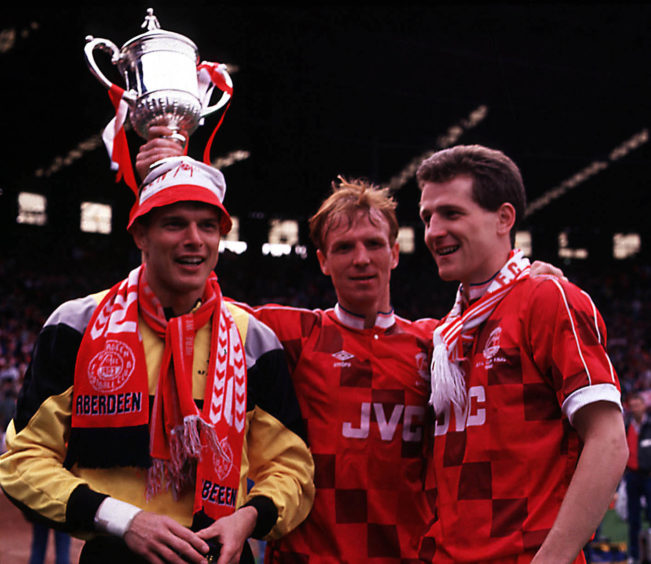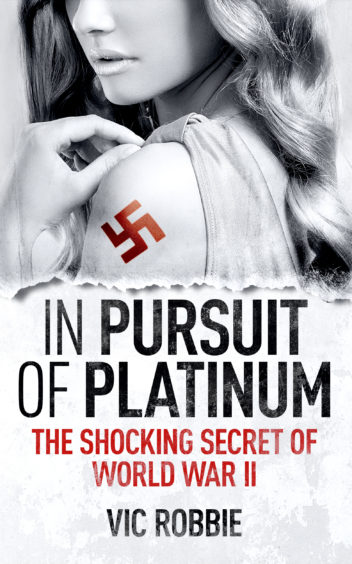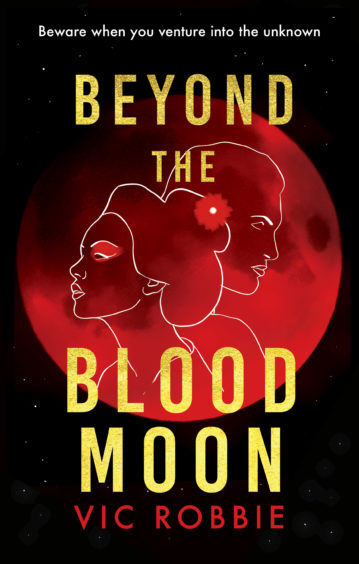He is the north-east man who has flown on Concorde with a group of the world’s greatest golfers.
He traded questions with the fiery Mike Tyson; and he was the only British journalist to watch Sebastian Coe break a world record after acting on a tip-off.
Successful thrillers
And, even though Vic Robbie is no longer chasing major sports stories with the attitude that genius is an infinite capacity for taking pains, the lifelong Dons supporter, who grew up in Aberdeen, is now captivating audiences in his new role as an author of successful thrillers.
Indeed, he has shifted careers without skipping a beat, befitting somebody who covered an extraordinary range of major sporting events across the world for a variety of different newspapers since the 1960s.
And Vic provided the Press and Journal with a glimpse into the background behind a few of his most memorable forays in the pursuit of champions.
His reminiscences include journeys to Europe and the United States and one lip-smacking trip to Hampden 30 years ago where he witnessed a nerve-shredding tussle in Glasgow.
He recalled: “As a sports journalist, you get a front row seat which is not always pleasant such as the time when a boxer bled over me and was then diagnosed HIV positive after the fight.
“But other experiences were much more enjoyable and even spectacular, such as Sebastian Coe on a balmy night in Florence in 1981 producing one of athletics’ greatest performances when he slashed his world 800m record down to one minute 41.37 seconds – an outstanding record that lasted all of 16 years.
“I had received a tip-off that Coe was planning something special that night, so I was the only British newspaperman who was present and, afterwards, we celebrated with champagne.
“But Coe refused even a sip telling me: ‘That could cost me hundredths of a second’.
“Before the year was out, he set the world 1,000 metres record and twice broke the mile record.
“In the same year, Chris Brasher and John Disley’s dreams of emulating the New York people’s marathon in London were realised, and I was fortunate enough to have the opportunity to take part in the world’s largest mass participation event.
“The winners Dick Beardsley and Inge Simonsen set the tone, crossing the line hand in hand, but more importantly, the idea of runners raising money to help others was born.
“We (at the Daily Mirror) set up the Mirrorthon team, comprising hundreds of runners, including sports heroes, actors, pop stars and politicians, to raise money for Muscular Dystrophy.
“Over the years, Mirrorthon raised hundreds of thousands of pounds for the charity and provided the template for other charities to benefit.”
Boycott
This was a period of rapidly advancing technology and an increasing emphasis on global sporting pageants such as the Olympic Games and the World Cup.
The Americans and several other countries had boycotted the 1980 Games in Moscow, following the Russian invasion of Afghanistan the previous year, and the Eastern Bloc reciprocated by refusing to take part in the competition four years later.
But, despite their absence from the action, that didn’t stop the Americans staging an unforgettable exhibition, on and off the track, the pool, velodrome and equestrian circuit.
As Vic recalled: “The 1984 Olympics in Los Angeles was memorable for more than just the sporting achievements. The opening ceremony deserved a gold medal for a show that was pure Hollywood and set the bar for every succeeding Games.
“Big, brash and enjoyable with 85 grand pianos and marching bands, the crowd was at first stunned into silence by the sight of a man in a jet pack flying out of a cloudless blue sky to land on the pitch.
“In those days, only James Bond did that in the movies. And on the track, it was just as spectacular with Coe retaining his 1500 metres title and all the controversy when rivals Zola Budd and Mary Decker physically clashed on the track.
“Three years later as a hurricane savaged Britain, I witnessed savagery of a different kind ringside in Atlantic City.
“The undisputed world champion Mike Tyson was defending his titles against countryman Tyrell Biggs, who had made derogatory remarks about the champion.
“And Tyson ruthlessly dismantled his opponent who eventually succumbed in the seventh round. Tyson admitted he wanted him to pay for his loose talk and afterwards said: ‘Every time I hit him, he screamed like a woman’.
“That was understandable, because I was frightened just talking to him.”
Back in his homeland, Vic was thrilled by the serried achievements of the Aberdeen team which surged to glory in the European Cup Winners’ Cup under Sir Alex Ferguson during the 1980s.
Theo Snelders
Yet he was also captivated by one of the club’s later achievements – and this happened when he was working as my boss at the Scotland on Sunday – during a fraught afternoon in Glasgow.
He said: “Perhaps the most nerve-wracking football match was the 1990 Scottish Cup final, which was the first to be decided by a penalty shoot-out.
“Aberdeen and Celtic were scoreless after extra-time, and the agony continued after 16 penalties failed to separate the teams.
“Then Dutch goalkeeper Theo Snelders elevated himself to Aberdeen legend by saving Anton Rogan’s spot kick.
“We all held our breath until Brian Irvine stepped up to convert, winning the cup and making history.”
As somebody who covered the whole sporting gamut, Vic was intrigued by the rise of European golf in the 1990s, especially when they began gaining dominance over the Americans in the biennial Ryder Cup competition.
And he was in his element during one very special journey across the Atlantic in an aircraft which is still regarded as the epitome of style.
He recalled: “Gamesmanship happens in all sport, but it’s unusual for it to come from your pilot. And it possibly helped Europe to Ryder Cup victory over the United States in 1995, starting a period of European domination.
“As we approached New York State’s Rochester Airport on Concorde, the captain flew low over the Oak Hill course and the practising American team below and waggled the plane’s wings announcing the Europeans had arrived.
“By the time the players got to the course, they were already one up.”
They subsequently turned the screw when the action commenced and, despite trailing 9-7 going into the final day’s singles matches, Bernard Gallacher’s squad won a dramatic victory with the required 14 and a half points.
Moving from the fairways to the covers
Vic Robbie has always been interested in history and, in the later part of his life, has created a series of acclaimed thrillers.
And although he realises writing books is a logical progression for a journalist, he told me fiction was “a very different world and, in some ways, harder”.
And he admitted his debt to the author of one of Scotland’s most famous books.
He said: “Back in the 1960s, when I was at the Scottish Daily Mail in Edinburgh, I knew Archie Hind, author of the Scottish classic The Dear Green Place, who worked there as a copytaker, and his vision inspired me.
“Archie went on to become a literary legend and Aberdeen City’s first Writer in Residence, but for me newspapers and magazines became all consuming.
Archie Hind on the Banks of the Clyde, Dalmarnock Power Station Behind (1977) by Alasdair Gray @GlasgowMuseums pic.twitter.com/g2U6ZeXDGm
— The Alasdair Gray Archive (@AGrayArchive) May 5, 2020
“However, the desire to write fiction still burned bright and it took a small report in The Observer about how France’s platinum reserves were smuggled out of Paris in a Bentley as the Nazis invaded to provide the spark.
“Most of my books are historical fiction which are halfway between fiction and history perhaps because I was used to dealing in factual events.
“That book In Pursuit of Platinum set me on the path, reaching No 2 in Amazon’s war stories rankings.
“During my research, which is one of the most enjoyable aspects of the work, the story for the second book in the series, Paradise Gold, where France’s gold reserves were sent to the Caribbean island of Martinique for safety during the Second World War, presented itself.
“And again, the third book, The Girl with the Silver Stiletto, was inspired by previous research. My latest, Beyond the Blood Moon, is a departure from the genre and it is more otherworldly.
“But the one I am working on at the moment, which is due to be published early next year, will again be a Second World War historical thriller.
“One of the first rules of fiction is ‘Show, don’t tell’, whereas when I was a young journalist I was instructed ‘Tell, don’t show’.
“Even now I smile, remembering the criticism which most journalists have at some time received about their reports: ‘It’s just a load of fiction’.”
He might not be chasing sports personalities for pearls of wisdom any more. But Vic Robbie is proving that he is a very long way from running on empty.
In Pursuit of Platinum: The Shocking Secret of World War II is available from Principium Press.
You can find out more about Vic Robbie’s work at vicrobbie.com
